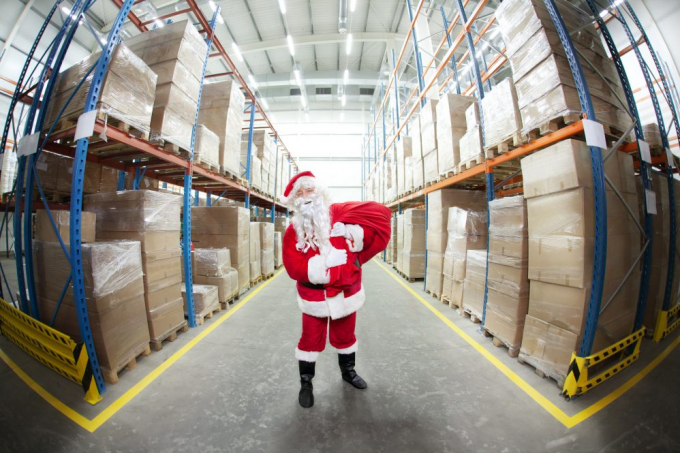June 9, 2025 | 02:41 GMT +7
June 9, 2025 | 02:41 GMT +7
Hotline: 0913.378.918
June 9, 2025 | 02:41 GMT +7
Hotline: 0913.378.918

Pandemic-related supply chain issues have caused a shortage of popular consumer goods ahead of the 2021 holiday season. Photo: Adobe Stock
As the world reaches the two-year mark of the COVID-19 pandemic, more items are becoming scarce because of a supply chain shortage across the globe.
Supply chain concerns are due to “record-level congestion at the Port of Los Angeles/Long Beach that has spread to the East Coast, the widespread power outages across China, shortages of truck drivers and service workers, and COVID-19-fueled infections and restrictions,” Tinglong Dai, a business professor at Johns Hopkins University, told USA TODAY in an email.
Shipping prices have skyrocketed, and the demand for items has outpaced the suppliers.
Before making a grocery list, here is a list of items you might not find:
This frozen treat is usually the perfect dessert, but in an email on Sept. 14, Ben & Jerry's parent company Unilever cited labor shortages as the reason for reducing the amount of flavors produced. The company said it will focus on producing its most popular flavors. Phish Food lovers, you have nothing to worry about.
Fertilizer plants, which lead to the production of carbon dioxide, had to reduce their output due to rising costs, causing shortages in food and other products, Per Hong, senior partner at consulting firm Kearney, said to CNBC. “We almost certainly will be faced with a global shortage of CO2 that is used widely. CO2 is used extensively in the food value chain from inside packaged food to keep it fresher longer, for dry ice to keep frozen food cold during delivery, to giving carbonated beverages their bubbles,” he said.
People have substituted fast food for home-cooked, comfort meals causing chicken to become scarce. In May, suppliers announced a shortage of chicken limiting some restaurants' menu items and increasing the price in stores.
Brazil is a supplier of most of the world's coffee, but the country has been experiencing a drought that slowed the production and transportation of coffee beans.
Households with small children should be aware that diaper prices have increased due to raw material price raises, shipping delays and container shortages, according to Business Insider. Diaper manufacturers, Proctor & Gamble (Pampers and Luvs) and Kimberly-Clark (Huggies) announced price increases in early April.
A customs dispute between the U.S. and Canada has kept the Alaska pollock, used for fish sticks and sandwiches, stored across the border. Cross-border restrictions have halted the transportation of the fish and may cause permanent seafood supply chain issues.
Rodney Holcomb, food economist at Oklahoma State University, explained to ABC27 News that concerns over the delta variant have some customers buying more than usual, as we saw at the beginning of the pandemic, just in case there is another lockdown.
Season of giving:Don't wait until Black Friday to start your holiday shopping. Here's why you need to shop now.
With restrictions on indoor dining, most people switched to pickup, takeout and delivery orders, limiting the supply of individual ketchup packets. Kraft Heinz confirmed to USA TODAY in early April that it is working to increase supplies, such as adding manufacturing lines that will increase production by about 25% for a total of more than 12 billion packets a year.
The holidays call for comfort foods – even if you aren't the one making it. But expect shortages of Marie Callender's 10-ounce and 15-ounce pot pies. According to parent company Conagra, it would be allocating shipments through Nov. 29 after it "encountered packing material challenges from our tray and carton supplier resulting in a production interruption," CNN Business reports.
With the holidays around the corner, meals being prepared across the nation may be missing a very important ingredient – seasonings. McCormick Gourmet spices are short of packaging supplies due to pandemic-related shutdowns. Lori Robinson, a spokesperson for McCormick, told CNN Business, "Gourmet is the only product line impacted by this packaging shortage," but can be substituted with their regular spices.
This lunchbox treat's production has been "below service expectations," as stated in an email sent to suppliers. The shortage persists as Kellogg's workers remain on strike, even though production lines have restarted as replacement workers were brought in.
In an Oct. 1 email to a grocery distributor, parent company Mondelez says there is "limited availability" on some of their items such as Sour Patch Kids, Swedish Fish candy, and Toblerone chocolate "due to supply chain constraints."
This is something that isn't new to the pandemic shortage list, but the industry has yet to keep up with the demand. The toilet paper shortage stems from lumber's raw material, wood pulp, which is used to make toilet paper. Fox Business reports only 60% of orders are being shipped out. Some retailers, such as Costco, have reinstated purchasing limits to preserve this household item.
(usatoday)

(VAN) With the war ongoing, many Ukrainian farmers and rural farming families face limited access to their land due to mines and lack the financial resources to purchase needed agricultural inputs.

(VAN) Vikas Rambal has quietly built a $5 billion business empire in manufacturing, property and solar, and catapulted onto the Rich List.

(VAN) Available cropland now at less than five percent, according to latest geospatial assessment from FAO and UNOSAT.

(VAN) Alt Carbon has raised $12 million in a seed round as it plans to scale its carbon dioxide removal work in the South Asian nation.

(VAN) Attempts to bring down the price of the Japanese staple have had little effect amid a cost-of-living crisis.

(VAN) Fourth most important food crop in peril as Latin America and Caribbean suffer from slow-onset climate disaster.

(VAN) Shifting market dynamics and the noise around new legislation has propelled Trouw Nutrition’s research around early life nutrition in poultry. Today, it continues to be a key area of research.